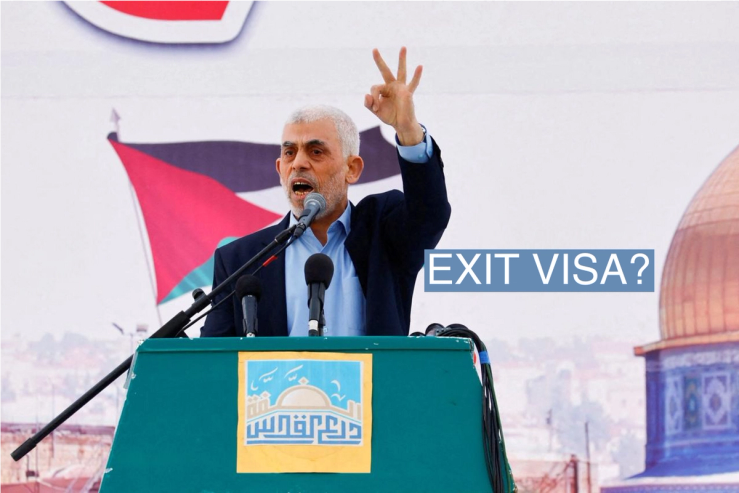The Scoop
The Israeli government has discussed internally a plan to allow some of Hamas’ senior military leaders to take refuge in a third Middle East country — potentially Algeria, Qatar or Saudi Arabia — as a step to accelerate an end to the war in the Gaza Strip and forge a new political leadership in the Palestinian territories.
The longshot initiative, described to Semafor by people who learned of it from senior Israeli and American officials, could include exiling top Hamas officials believed to have mastermined and executed the October 7 terrorist attack on southern Israel. These include the organization’s overall political leader in Gaza, Yahya Sinwar, and Mohammed Deif, the commander of Hamas’ elite military unit, the Al Qassam Brigades.
The exile plan, some Israeli officials believe, could form part of a package of steps to end the Gaza war that includes Hamas releasing all of its remaining hostages; the laying down of arms by its lower-rank fighters and commanders; and the establishment of a new post-war Gaza leadership free of Hamas politicians and operatives. Israeli officials are contemplating whether a quickened end to the fighting could then bolster a Biden administration-brokered diplomatic initiative that appeared close to normalizing relations between Israel and Saudi Arabia before the October war broke out.
“By ending the war quickly, such a deal would importantly pave the way for the near-term revival of a game-changing Israel-Saudi normalization deal to counter the more strategically significant Iranian challenge in the region — a major U.S. objective,” John Hannah, a senior White House official in the George W. Bush administration and a fellow at the Jewish Institute for National Security of America told Semafor. He said he’s discussed the exfiltration plan with both Israeli and American officials in recent weeks.
The proposal faces deep skepticism among Mideast governments that Hamas’s leadership in Gaza would ever agree to leave its territory, according to Hannah and Arab officials who’ve discussed the exile plan with the Biden administration. Doing so would be essentially admitting defeat for Hamas hardline militants, they say. And Sinwar and Deif, in particular, would likely prefer to be martyred on the battlefield than safehavened in a third Arab country.
“The Hamas guys in Gaza won’t leave,” a senior Arab official told Semafor, who had already discussed the exile plan.
In this article:
Jay’s view
Exiling Hamas’ military leadership would draw from an old strategic playbook. In the 1980s, the Israeli government allowed Palestinian leader Yasser Arafat and the Palestinian Liberation Organization — which was under an Israeli military siege in Lebanon — to move their headquarters to Tunisia. But today’s Middle East is significantly different than 40 years ago, and Hamas, an Islamist organization rather than a nationalist one, is no PLO.
One key question: Which country might provide safe haven for radical Islamist fighters like Hamas’ Sinwar and Deif? In December, LeMonde scooped a study by a Saud Arabia-based think tank, the Gulf Research Center, which contemplated Hamas’ military leaders in Gaza moving to Algeria. The study envisaged a group of Arab armies then providing security in the Palestinian territory under the banner of the United Nations. (The Gulf Research Center has stressed its study wasn’t a formal Saudi government proposal.)
But Algeria has offered no indication that it’s willing to host Hamas. The government in Algiers fought a decade-long civil war against Islamist insurgents, and likely would be wary of allowing Hamas — which receives arms and funding from Iran’s revolutionary government — to establish a base due to fears it could destabilize the North African country. John Hannah said the Israelis have also suggested Saudi Arabia could provide Hamas leaders sanctuary and allow Riyadh to play a leading role in shaping post-war Gaza and potentially establishing an independent Palestinian state. But Saudi Arabia’s monarchy views the Muslim Brotherhood Islamist movement, which forged Hamas’ creation, as a major political threat.
Qatar, which currently hosts Hamas’ political leadership, is another possibility. Doha is also leading negotiations to gain the release of about 130 hostages still being held by Hamas in Gaza. But both the Biden administration and Israel have both indicated they might request Qatar to end this relationship when the war is over.
Finally, Hamas’ military leaders know Israel has publicly pledged to kill all the planners and soldiers behind the October 7 attack, regardless where they’re based or how long it will take. Sinwar and Deif likely would be only slightly safer in Algiers or Doha than they are in Gaza over the long term. “It will take time, just like after the Munich massacre, but we will lay our hands on them wherever they will be,” the head of Israel’s Mossad spy agency, David Barnea said at a funeral in Israel this month. “Every Arab mother ought know that if her son participated, directly or indirectly, in the slaughter of 7 October, his blood shall be upon his own head.”
The View From Gaza
Hamas, since its inception in 1987, has broken from Arafat and the PLO and defined its war against Israel in strictly religious terms in which martyrdom is a goal. “Jihad is its path and death for the sake of Allah is the loftiest of its wishes,” the organization proclaimed in a covenant released a year after its creation.
The Israel Defense Forces are currently hunting for Sinwar and Deif as IDF units push further into southern Gaza and dig deep into the elaborate tunnel network Hamas created to shield its fighters. Israeli officials believe Sinwar and his closest troops are likely holding many of the hostages, or keeping them nearby, in an effort to protect themselves against Israeli attacks. But many current and Israeli officials believe Sinwar and Deif will prefer death to either capture or fleeing abroad.
Gershon Baskin, an Israeli diplomat and former mediator with Hamas, drew a stark difference between Arafat leaving Beirut in 1982 and Sinwar today in Gaza. “I believe Sinwar knows he will die a martyr,” Baskin said last week in the Jerusalem Post.


